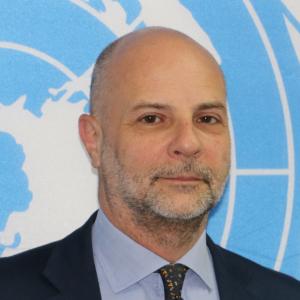Ladies and Gentlemen,
Honorable guests,
I am honored to be at the 15th Annual Conference to Address Violence Against Women and Girls, marking the Islamic Day for the Elimination of Violence Against Women, speaking on behalf of the United Nations Assistance Mission for Iraq.
Special Representative of the UN Secretary-General (SRSG) Jeanine Hennis-Plasschaert sends her greetings. She apologizes for not being able to participate, as she is presiding over a ceremony marking the 20th anniversary of the attack on the United Nations headquarters in Baghdad. Twenty-two lives were lost in the blast, including that of then SRSG Sérgio Vieira de Mello. Many others were injured, including Iraqi staff who are still serving with UNAMI, and we pay tribute to all of them.
Ladies and gentlemen,
We applaud the efforts of the al-Hakim Foundation for convening this annual event. We commend the personal commitment and efforts of His Eminence Sayyid al-Hakim in defence of human rights in general and specifically on those of women and girls subject of this conference.
We wish to welcome the Government Programme and the Ministerial Programme Paper Agreed upon by Political Blocs, which include provisions on the empowerment, support, and protection of women, and the commitment to sending relevant draft laws to the Council of Representatives. We welcome in particular the commitment to address violence against women.
The Government Programme is in line with the 2016 Joint Communique of the Republic of Iraq and the United Nations on Prevention and Response to Conflict-Related Sexual Violence, which included commitments to support survivors and ensure accountability.
Within this context, and as we commemorated on 3 August the Yazidi genocide, we wish to stress once again the importance of bringing to justice the members of Daesh responsible for abhorrent crimes of sexual violence. I am glad that the UN, through UNITAD and other UN entities, is assisting this endeavour.
In the same vein, we wish to highlight the importance of the 2021 Yazidi Survivors’ Law, which recognizes the critical role of reparations in helping survivors to rebuild their lives. And I would like to take this opportunity to call for its implementation at greater speed, without unnecessary obstacles, and for its expansion to cover victims from all communities, including women forced into marriage by Daesh, as well as children born of rape.
Still in terms of laws, we must also express our concerns regarding the lack of adoption of a law against domestic violence. Not only women, but also children, the elderly and other family members at risk of such violence deserve to be fully protected by the law, and in accordance with the best Iraqi traditions, religious and cultural values.
We wonder, candidly, what person, regardless of affiliation, cultural identity or religion, would defend the use of violence against family members? In other words, why this continued reluctance to debate and adopt this important law? The responsibility of leadership cannot be overstated. We therefore call again upon politicians and legislators to address this issue by looking into existing drafts, including with respect to the issue of shelters for persons at risk of such violence.
Ladies and gentlemen,
As we move towards holding elections on 18 December, we would like to commend the Government for establishing the High Committee to Support Women’s Political Participation in the forthcoming Provincial Council elections. We look forward to working with the High Committee, in close coordination with the Independent High Electoral Commission. These institutions, together with other state institutions and all political parties, shoulder an important responsibility in addressing any form of hate speech, harassment, intimidation and violence against women candidates and voters. Transparent and credible elections require a conducive environment for the participation of all Iraqis.
Ladies and gentlemen,
Before concluding, we must mention the current public debate on the use of universally accepted terms. Regrettably, this debate has been characterized by wrong information and misconceptions, including about the role of the UN, which may impact negatively on activities within the context of women’s rights or even lead to intimidation, harassment and threats. As the SRSG explained on previous occasions, all of us value and appreciate religious beliefs, local contexts, cultures and traditions, as we promote the rights of everyone. We hope that rational, informed and respectful debate will prevail.
In closing, as many of you will know, this year we mark the 75th anniversary of the Universal Declaration of Human Rights, adopted in 1948 with the vote of Iraq. The Declaration is very much relevant today for any democracy, including Iraq. Let us honour the Declaration’s promise of human rights for all.
Thank you.


